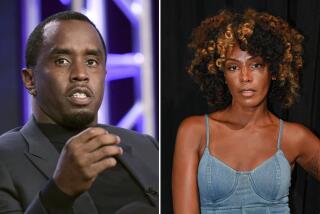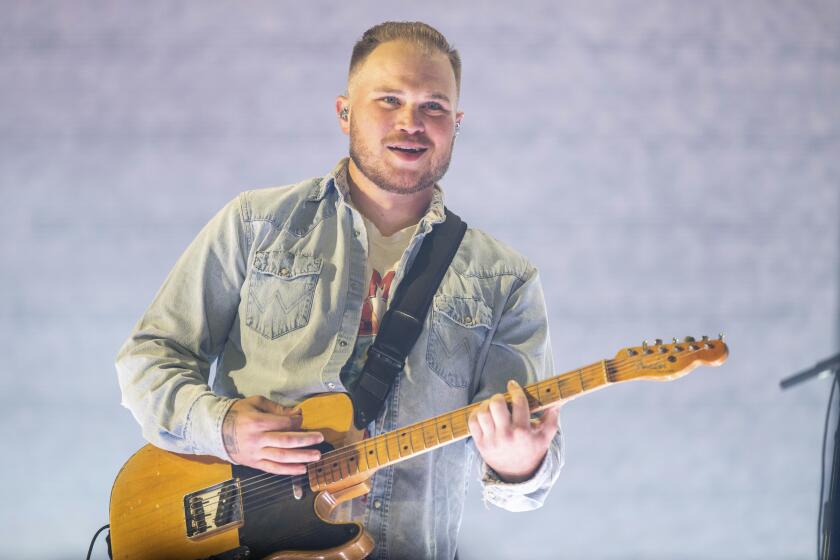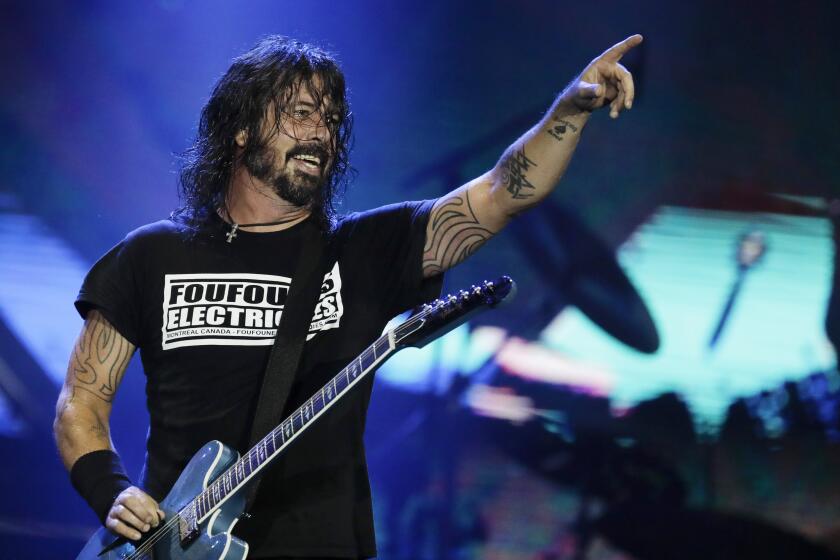Alex Chilton, my own music teacher
I was supposed to go out and hear some music. I didn’t know if it would be some clanging revelation, a sound I’d never heard before, or a blast from the past given new oomph by some young punks so in love with the big, crazy history of American music that they have to rip it open and devour it. I’m at South by Southwest in Austin, Texas, the biggest, wildest annual gathering of melodic music-makers this nation knows, where old and new collide in an explosion of amplifier feedback and spilled beer.
I should be out there, damaging my hearing and locating some joy. Instead, I’m sitting in my hotel room, writing this elegy for Alex Chilton, the Memphis, Tenn.-rooted musician who died, apparently of a heart attack, Wednesday at 59 in New Orleans. Chilton was supposed to play here Saturday with his band Big Star; it was the one show on my schedule that I was unequivocally excited to see. Instead, he’s gone, leaving South by Southwest -- and rock ‘n’ roll -- punched through like a cheap paper bag.
That paper bag analogy has a specific reference point. Big Star, which Chilton formed in 1970 with the late Chris Bell, Andy Hummel and Jody Stephens, was named after a Memphis supermarket chain. That group’s indignantly loud and gorgeous power pop inspired more young rockers than did any other fairly obscure rock save that of the Velvet Underground. Somewhere in a trunk, I have a tattered souvenir from a Big Star store in Memphis, picked up on a pilgrimage to the South that I made when I was barely 21, when I set forth to find some mineral traces of the blues and early rock heritage I’d only read about in books.
Powerful pop
What I found on that journey was Alex Chilton. I’d already come to love Big Star’s catalog, introduced to me via the mix tapes my friends and I made for one another as we built our own twisted history of Americana from what the band X once called “the unheard music.” Alex Chilton was a wandering, heretical patriarch of our new religion. Bands like the Replacements and R.E.M. found him inspirational. (Members of one such group, the Posies, would later play with a reformed Big Star.) College radio DJs turned Big Star’s catchy but unkempt songs into the hits they should have been the first time around. The band had been active in the 1970s, but it belonged to us, the kids fighting off the shadow of the baby boomers who’d been too dumb to realize how great it was.
We shook our messy hair to Big Star’s strutting rockers, like “In the Street” (the band’s best-known song, thanks to Cheap Trick’s version for “That ‘70s Show”) and “September Gurls,” party anthems that were like Led Zeppelin hits for the kids who got beaten up by real Zeppelin fans. And we slow danced to Chilton’s ballads, especially those from Big Star’s third album, “Sister Lovers,” made after the band had basically fallen apart. That record remains one of the most lucid expressions of youthful sorrow in the annals of guitar pop, a perfect encapsulation of the pain of that worst, first heartbreak.
Chilton was a music-industry vet by the time he made “Sister Lovers” with the help of Stephens, producer Jim Dickinson and a bunch of other Memphis characters. He’d been a teen wonder fronting the Box Tops, whose song “The Letter” featured a Tom Jones vocal style that Chilton eventually abandoned for something more cracked and crazier. Big Star had not made it big. “Sister Lovers” tells the story of Chilton’s unraveling. Its songs are as beautiful as a red drop of blood, but it’s never sentimental. They made me love this mess of a guy.
History onstage
Then I saw him live, first on tour with a shaggy outfit he’d put together after the indie rockers had uncovered his past work, and then down South, on that pretentious sacred walkabout I’d taken into the land of Elvis and Muddy Waters. By that time, Chilton had explored raw noise with the performance-art-damaged combo Tav Falco’s Panther Burns, and helped the Cramps, whose debut album he produced, turn rockabilly into horrorcore. He’d seen and done enough to be cynical. And he projected that attitude. Yet amid music-making he became something remarkable: a living repository of that unheard music, a profane, profound, wisecracking American Music Man.
Chilton was famous for packing his sets with the most obscure and hilarious rhythm and blues and early rock songs he could find. He’d take them at double speed or stretch them out as if we were all tripping on hallucinogens in a hotel lounge in the hinterlands. He recorded some of these shattered gems on solo albums, but they were best experienced live, in sets that delighted everyone present, especially the rascal in front of the microphone.
In New Orleans, the town Chilton called home for many years, I saw him play a show heavy on boogie woogies and rolling, sexy blues. Two nights later, he and I were at the famous Antenna Club in Memphis, and his sound that night was rougher, more damaged, yoking together the legacies of punk and outlaw Southern bar music. These performances opened my ears to American music in ways that nothing I’d read or heard before had. His offhand genius reminded me that this music was funny and rude as well as deep and beautiful.
I was a young woman in love with American sounds but a little scared of what seemed like a hallowed history; Chilton was a seasoned knockabout who insisted on showing me -- and everyone in the room -- that history is simply what people make out of their damage and their rudeness, their lust and their ambitious beating hearts. For that lesson and all the laughs, I will never forget Alex Chilton. And I’m mad he’s not playing in Austin on Saturday night. I was going to yell out for a few of those songs he’d taught me so long ago, plus one or two of his own, and was prepared to be rebuffed, and thrilled, at what he’d play anyway.
More to Read
The biggest entertainment stories
Get our big stories about Hollywood, film, television, music, arts, culture and more right in your inbox as soon as they publish.
You may occasionally receive promotional content from the Los Angeles Times.










